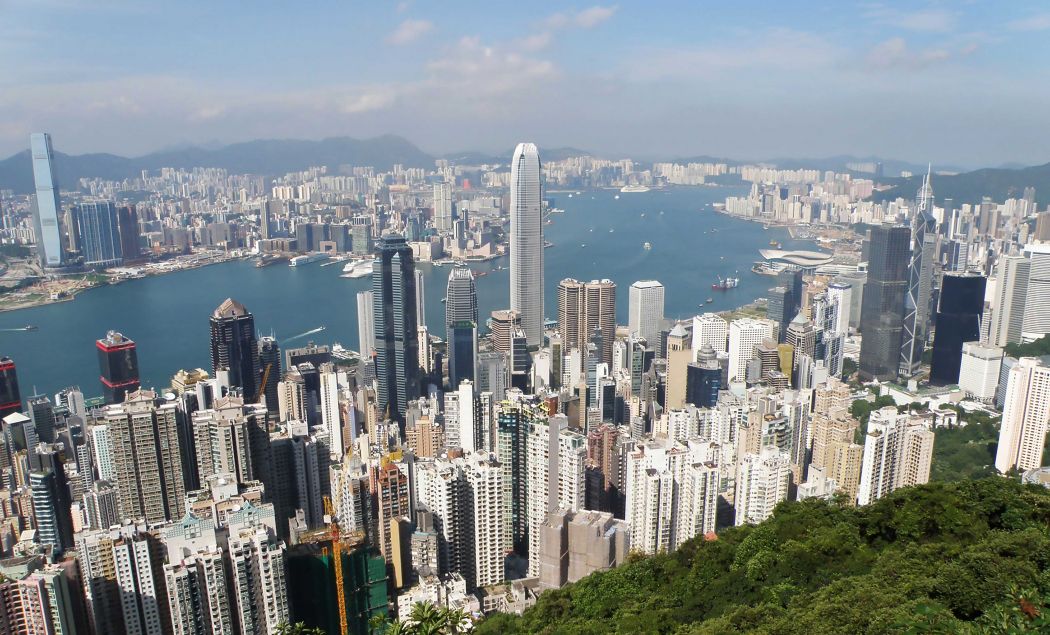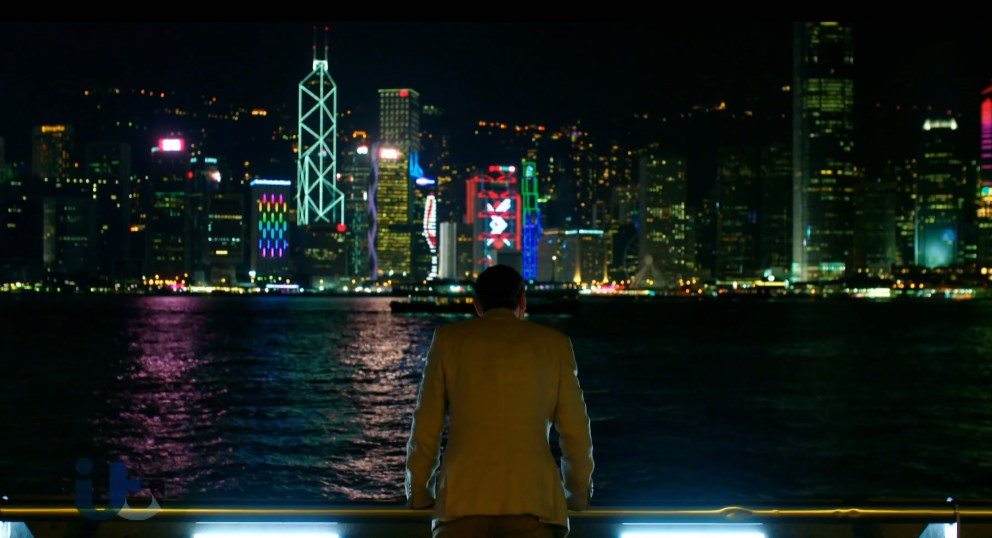I wanted to like Strangers, ITV’s eight-part crime mystery series set in Hong Kong. I really did. You see, I grew up in London, as the child of Hong Kong Chinese parents in the 70’s and 80’s, then lived and worked in Hong Kong for more than 20 years.
I was excited by the idea of a mainstream British TV series shot in the city and showcasing British-Chinese and Hong Kong talent. Sadly, I was left disappointed and dissatisfied by the end of the series.
Admittedly, the first sight I caught of publicity for the show didn’t inspire confidence. It was a poster at a bus-stop showing the actor John Simm standing against a backdrop of Hong Kong’s iconic neon shop signs.
But something wasn’t right – the signs were written in simplified Chinese characters. These characters were introduced after China’s communist party founded the People’s Republic of China in 1949 and are now used in mainland China, but not in Hong Kong.
Hong Kong remained separate from China as a British colony for 150 years and was promised its way of life would continue unchanged for 50 years after Britain transferred sovereignty to the Chinese in 1997. It uses traditional Chinese characters.
When I read the characters on the poster, I realized they didn’t make sense. It looked like someone had put the words “he’s a long way from the truth” into a machine translator for Chinese and copied the results. In fact, someone who responded to my tweet about the poster replicated the results by doing just that.
Dear @ITV, a few notes about your publicity poster for #Strangers:
(1) #HK uses traditional, not simplified Chinese characters
(2) 他是很長的一個路從真相 is ungrammatical, doesn’t make sense
(3) Please get a native speaker to translate/edit
p.s. Look forward to Anthony Wong on TV pic.twitter.com/Je0gsKX6Wi— Yuen Chan (@xinwenxiaojie) September 5, 2018
This didn’t bode well. But I was somewhat reassured to see a subsequent ad for the show on the front page of a London free-sheet written in traditional characters. Besides, the prospect of seeing Hong Kong locations, performances from Hong Kong stars Anthony Wong Chau-sang and Kenneth Tsang Kwong, and hearing actual Cantonese dialogue on British TV, was as exciting as it was groundbreaking.
Apart from the 1981 BBC series The Chinese Detective, I don’t recall any British TV programme from my childhood that featured characters of Chinese or East Asian heritage in lead roles. The only people I saw who looked like me in popular culture were comedy figures to be laughed at such as the Chung Su-lee, the Chairman Mao-loving, little red book-waving English student in the ITV sitcom series Mind Your Language – which was full of racist stereotypes, or villains.
And then there were two 1970s Japanese TV series based on classic Chinese stories, The Water Margin (a tale about a band of patriotic outlaws in the Sung dynasty) and Monkey Magic (based on Journey to the West, a fantastical and epic story about a voyage to bring Buddhist scriptures from India to China).
The books on which they were based are considered two of the four greatest novels in Chinese literature, tales that are familiar with adults and children across the Chinese-speaking world, including the diaspora.
But the portrayal of the same characters and stories I’d learned about from my parents – both immigrants from Hong Kong – soon made me the butt of playground jokes. In the UK, the Japanese made series was dubbed into a kind of faux “Ching Chong” Chinese accent.
Kids would mimic this accent and scenes from the show to tease me and when I protested that it was a Japanese programme, they’d inform me that Chinese and Japanese were the same. One of them even insisted Hong Kong was a part of Japan.
I recently came across a shocking clip from a 1976 episode of Nationwide posted on the BBC Archive Twitter feed that illustrates the prevailing attitudes of the time. It reveals that the man responsible for writing the English dialogue for the shows spoke no Chinese or Japanese. He basically made up the lines according to the visuals and the lip movements of the characters.
At one point the dubbing director tells the English voice actors to “make it sound more “Chinesey,” a register he describes as “English Oriental tradition, somewhere between Fu Manchu and the Goon Show.” The Fu Manchu trope, exotic, inscrutable, dangerous and degenerate, pretty much sums up the way “Orientals” and the Orient were portrayed in popular culture at the time.
#OnThisDay 1976: The Water Margin was first broadcast on BBC Two. Here’s how a Japanese TV epic, based on a Chinese Classic, was dubbed into English by a writer who understood neither Chinese nor Japanese. pic.twitter.com/0kuOO4q1Yv
— BBC Archive (@BBCArchive) September 21, 2018
Thankfully, we’ve moved on in many ways since then – and the fact we can have a show like Strangers is a testament to that. Yet for me, the series also shows us how far we still have to go.
Unlike those who worked on the English TV version of The Water Margin, those behind Strangers obviously did research. It speaks of their ambition that they tried to include issues such as local activism against greedy developers and housing inequality, police corruption, discrimination against the LGBT+ community, ethnic minorities and even weaving a Chief Executive election into the storyline.
These are all legitimate concerns, but the show at best misses the mark and at worst, misrepresents the city and its problems.
The result is the depiction of an utterly corrupt and lawless society where everyone is on the take, from the police to people who work in shops, a city with a bent judicial system, where a seemingly radical and out lesbian can be blackmailed through photos showing her kissing a girl, and where the only South Asian man with a proper speaking part works for the Triads.
The interiors of the police stations are poorly lit and grimy, in stark contrast to the modern, gleaming offices of the British Consulate. It may be shot on location and use local actors, but this is not a Hong Kong I recognise.
There is gross inequality in Hong Kong, the shortage of affordable housing is a critical issue, property developers have too much power and enjoy far too cosy relations with the government. There are well-documented cases of police brutality, police corruption exists and judicial independence is under threat.
But the kind of rampant and endemic corruption that was commonplace in Hong Kong in the 60’s and is widespread in mainland China is not a defining feature of everyday life in today’s Hong Kong.

As for the threat to Hong Kong’s judiciary, that doesn’t come from corruption, but from political pressures as a result of Beijing’s tightening grip and restrictive interpretations of the freedoms Hong Kong was promised under the post-1997 One Country, Two Systems policy.
This policy was supposed to ensure a high degree of autonomy, an independent judiciary, a free press, and eventual universal suffrage for Hong Kong’s leader.In reality, the Chief Executive is still “elected” by an Election Committee formed through a limited franchise and stacked with pro-Beijing members.
It is the leadership in Beijing that decides who gets elected and increasingly, it is Beijing’s wishes that are directing Hong Kong’s policies. But you would never know this from watching Strangers, even though the Chief Executive election is a key part of the storyline.
And the mix-up over Chinese characters and language from the publicity poster also appeared in the show – official documents such as a birth certificate and school records are in simplified Chinese. Many of the characters have Putonghua names even though most Hongkongers speak Cantonese.
A villain is surnamed “Xo” a spelling I’ve never seen for a name that is transliterated as “So” in Cantonese and “Su” in Mandarin. Some of the Cantonese dialogue is stilted and unnatural and it is clear that some of the cast are not native speakers.

These aren’t details the average British viewer will spot, but given the amount of effort that went into making the series, it’s a pity the programme-makers did not take small extra steps to avoid such careless mistakes.
Despite the welcome casting of British East Asian actors in leading roles, the participation of leading Hong Kong talents and the liberal use of (at times ropey) Cantonese dialogue, I can’t help feeling that Hong Kong remains an exotic, dangerous and mysterious backdrop for the adventures of a white British everyman hero in Strangers.
In the end, this was a lost opportunity to provide British viewers with a window into Hong Kong’s complex cultural and socio-political make-up, a snapshot of where the city is at 21 years after Britain handed over sovereignty to the People’s Republic of China.
Instead, in failing to so much as acknowledge Beijing’s influence over Hong Kong’s politics and the clumsy lack of attention to the ways in which Hong Kong still differs from the Mainland, the series shows that just two decades after the royal yacht Britannia sailed out of Victoria Harbour, Hong Kong and its people are still a part of the mysterious Orient, as much strangers as they ever were.
